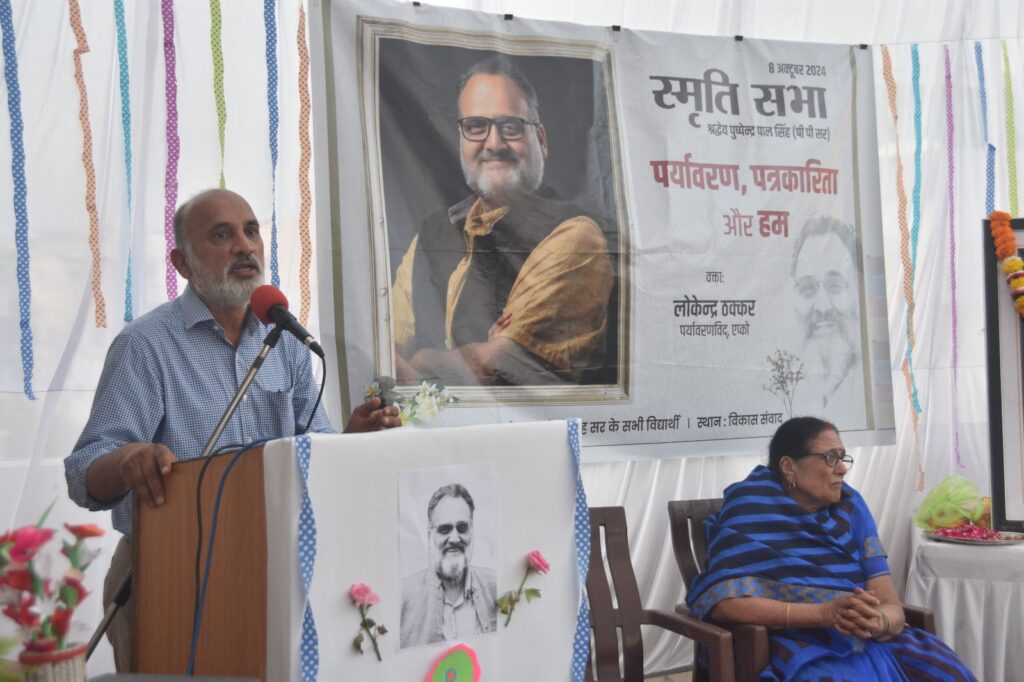
At a recent program organized in Bhopal to celebrate the birth anniversary of the late Pushpendra Pal Singh (fondly known as PP Sir), environmentalist Lokendra Thakkar, associated with the Environmental Planning and Coordination Organization (EPCO), spoke on sustainability and the deep connections between the environment, journalism, and the personal example set by PP Sir. His words struck a chord with those present as he emphasized the importance of sustainability in our daily lives.
The Most Sustainable Choice: What You Already Own
Thakkar opened his speech with a powerful reflection on sustainability, using an everyday item as a metaphor. “When we talk about sustainability, what is it? What is the most sustainable T-shirt? I think the most sustainable T-shirt is the one you have put on right now,” he stated. This remark highlighted a simple yet profound idea: true sustainability starts with making the most of what we already have.
He went on to describe PP Sir as a model of sustainable living. According to Thakkar, PP Sir embodied the principles of sustainability in his personal life, including his wardrobe choices. “I had never seen Pushpendra ji in different or branded clothes. He lived a life of simplicity, from which we all should learn,” Thakkar added. His reflections on PP Sir’s lifestyle were a reminder that leading by example can be more impactful than words alone.
Sustainable Practices: Beyond Clothing
Thakkar also touched on how PP Sir’s sustainable habits extended beyond his wardrobe to everyday practices. He recalled how Pushpendra ji used paper with great care, minimizing waste. In contrast to today’s rising trend of using tissue paper, PP Sir followed the old tradition of using cloth, a more sustainable choice. This small but significant act exemplified his mindful approach to resources, something we can all learn from.
The Challenges of Journalism in the Technological Age
Thakkar’s speech then shifted to the challenges that technology brings to journalism, particularly in the realm of environmental reporting. While acknowledging that technology has made it easier to gather and share information, he pointed out that it has also raised the stakes for accuracy and fairness.
“Reporting has become easy due to technology, but what you are writing has become very important. It has become difficult to do journalism impartially, and a journalist has to work amidst many obstacles,” Thakkar observed.
He emphasized that while there has been progress in environmental journalism, with more in-depth and frequent reporting, many challenges remain. The rise of technology has not eliminated the difficulties journalists face in maintaining integrity and balance in their work. Thakkar concluded that despite these challenges, technology has the potential to improve reporting standards if used responsibly.
Remembering Pushpendra Pal Singh: A Man of Many Virtues
The event also provided a space for those who knew PP Sir to share their memories of him. Senior journalist Pankaj Shukla fondly remembered him as a man without enemies, someone who embodied the spirit of “Ajatashatru”—one who has no enemies. Shukla remarked that PP Sir never saw anyone as an adversary, a quality that made him unique in both his personal and professional life. “He taught us to understand and see letters, giving us the ability to recognize the power of words,” Shukla said, underscoring the lasting influence of PP Sir’s mentorship.
Sandeep Kumar, another senior journalist, praised PP Sir’s remarkable ability to “read time” and navigate the complexities of the world without being swayed by personal biases. According to Kumar, PP Sir always worked for others selflessly, without expecting anything in return. His approach to journalism was deeply ethical, and his students learned from him how to move forward in the profession with integrity.
A Brother with a Different Power
In an emotional tribute, PP Sir’s younger sister, Yogita Singh, shared personal memories of her brother, who raised her like a daughter. She spoke of his selflessness, even when it came to his health. “Even when he had a fever, he would say, ‘I am fine,’ and continue working,” she recalled. Yogita described her brother as possessing a unique inner strength, likening him to Swami Vivekananda in his dedication and determination.
A Legacy of Simplicity, Sustainability, and Service
The event not only celebrated the life of Pushpendra Pal Singh but also offered valuable lessons in sustainability, journalism, and living a life of service. Thakkar’s reflections on sustainability—whether through the metaphor of a simple T-shirt or PP Sir’s conscientious use of paper—encouraged everyone to adopt more mindful, sustainable practices. Meanwhile, the tributes from journalists and family members alike painted a picture of a man whose legacy continues to inspire those around him.
In a world where both the environment and journalism face significant challenges, the life and teachings of PP Sir offer timeless guidance on how to move forward with integrity, compassion, and respect for the world around us.




